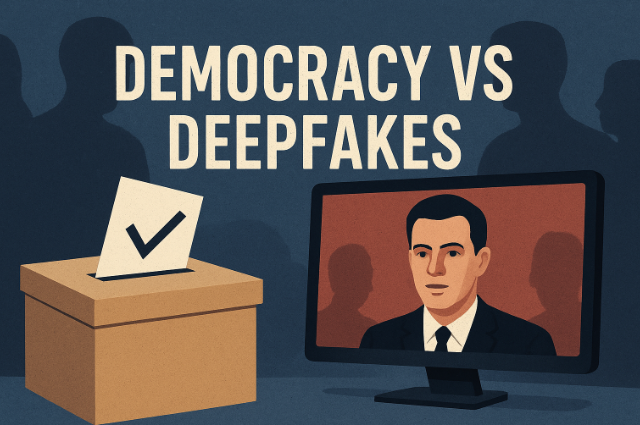
In 2025, political trickery doesn’t need ballot stuffing; it needs a well-placed AI video.
The 21st century didn’t ask for permission. It barged in data in one hand, surveillance in the other. We now live in a world where reality isn’t what’s happening, but what’s shown to be happening. The father of AI once said, “You know AI is advanced when you can't tell it from humans.” Well, we’re here. We’re living in a time where the biggest threat to democracy isn’t a coup, a dictator, or even voter apathy. It’s a deepfake with perfect lighting and a convincing script. One viral video. One AI-generated voiceover. One piece of content that feels just real enough to bend belief—and break elections.
The Age of Digital Particles and Ideological Wars
Every era had its weapons. The printing press disrupted the church. The telegraph wired revolutions across continents. Radio stirred patriotism and propaganda alike. And the internet? It made everyone a publisher. But what AI has done is something more precise. It hasn't just put power in people's hands, it’s made it impossible to tell whose hands the power’s in. Think of it like this: a single person, with no technical training, can now generate a lifelike video of a politician saying something they never said. They can write political manifestos indistinguishable from official party releases. They can flood forums with fake debates, plant fake leaks, and manufacture outrage at scale. All it takes is a prompt.
We’re not in the information age anymore. We’ve entered the misinformation warfare age. And unlike before, there’s no single source you can point to. It’s everywhere, and it’s too fast.
AI in Elections: The Perfect Trojan Horse
Here’s the real problem: the 2025 elections could become the biggest experiment in AI trickery the world has ever seen. The tools exist. The incentives are massive. The oversight? Flimsy at best.
Political actors no longer need hackers in dark rooms. They need smart prompts and an internet connection. That’s it. Want to erode trust in a candidate? Generate hundreds of AI news snippets questioning their character. Want to fake a scandal? Use AI to create a phone call, a video, or a screenshot. Want to demoralize voters? Create a flood of AI-generated posts suggesting their vote won’t count. It’s fast. It’s scalable. And it’s dangerously plausible. When You Can’t Tell What’s Fake, Everything Starts Feeling Fake
That’s the most chilling part. AI doesn’t just fake things; it creates a crisis of epistemology. How do you know what you know? How do you trust anything when the content is visually perfect, emotionally charged, and technically legitimate? We’ve reached a point where the line between “truth” and “falsehood” isn’t blurry—it’s been deleted. And once people stop believing that truth
can be known, democracy becomes noise. If every piece of evidence can be faked, then every denial becomes plausible. And every accusation, no matter how absurd, becomes possible.
In short, the goal of AI election trickery isn’t just to win. It’s to confuse—to make the entire system look unreliable.
How Do You Fix It?
This isn’t just a policy problem. It’s philosophical.
We need to rethink how we consume information. Critical thinking isn’t optional anymore. It’s survival. Schools need to teach information hygiene the same way they teach mathematics. Platforms need to shift from being passive bulletin boards to active guardians of digital authenticity. And governments? They need to stop reacting and start anticipating.
Here’s what a response should look like:
- AI Watermarking Legislation: Any AI-generated content—text, image, or video—should be mandatorily watermarked and traceable. No exceptions.
- Election-Specific AI Surveillance: A dedicated watchdog body with AI literacy, political neutrality, and real-time response powers. Think of it like an AI-powered election commission within the election commission.
- Public Awareness Campaigns: People need to know the nature of the threat. Not fear-mongering, but empowerment. Teach people how to check metadata, question sources, and spot inconsistencies.
- Platform Accountability: Meta, X, YouTube, Reddit—if these platforms don’t step up, they’re complicit. The rules of content moderation need to evolve with the tools of content generation.
- Ethical AI Development: The research community has to move faster. Detection tools must match generation tools. This is a digital arms race, and right now, the bad guys are winning.
Democracy Wasn’t Built for This
Let’s not forget that democracy was built on the assumption that people are deciding. Real people, making real decisions based on shared facts and visible actions. But what happens when those facts are engineered? When are those actions simulations? When does belief replace truth? Democracy depends on two invisible threads: trust and truth. AI-generated misinformation can tear both apart. What happens when voters stop trusting debates, because the clips might be fake? What happens when candidates deny everything because they can claim it's just a deepfake? What happens when policy discussions devolve into battles over which source is more “authentic,” rather than what’s right?
We’re not just fighting for free speech. We’re fighting for real speech.
The Way Forward: Don’t Panic, But Don’t Wait
AI isn’t going away. It’s not the villain. Like every tool, it reflects the hand that wields it. But this one is faster, smarter, and harder to trace than anything we’ve seen. So here’s the test: can our democratic institutions evolve faster than the tools that seek to undermine them?
Can we learn to trust again—but intelligently? Can we build mechanisms of verification and authentication that preserve what democracy means, not just how it operates? Because if we can’t, we’re not just facing rigged elections. We’re facing a crisis of meaning. And the worst part?
Most people won’t even realize they’ve been manipulated until it’s too late.
